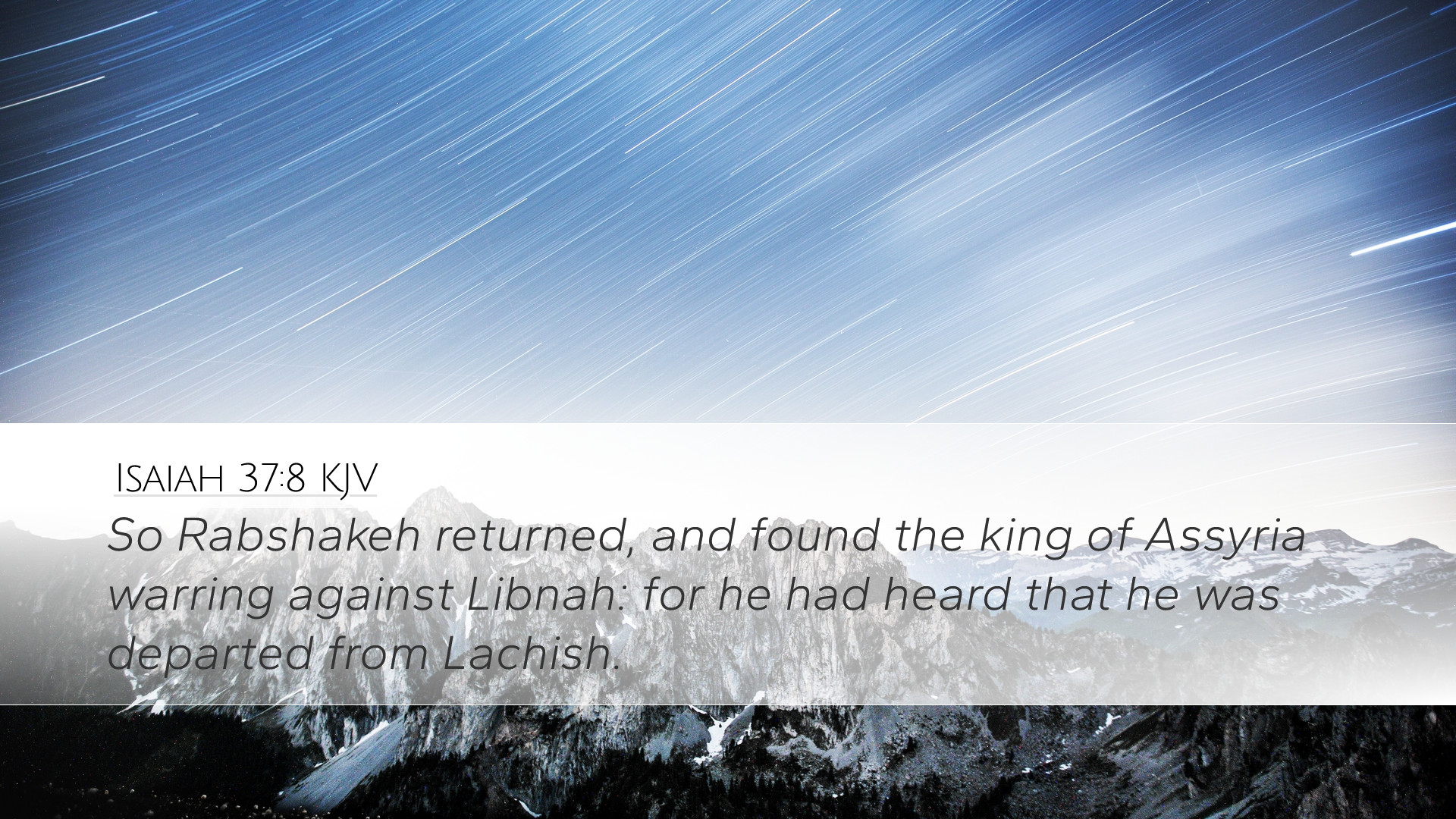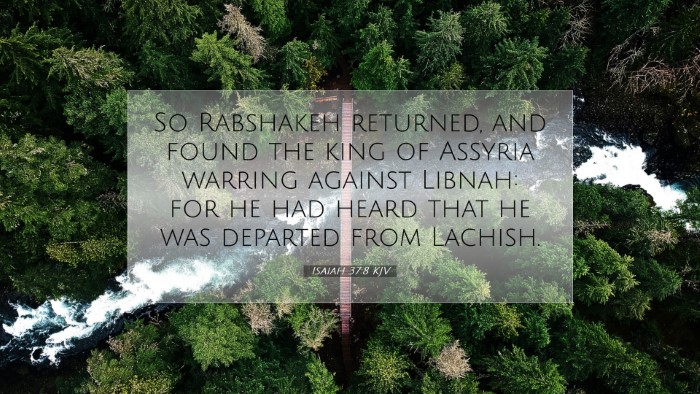Commentary on Isaiah 37:8
Isaiah 37:8 states: "So Rabshakeh returned, and found the king of Assyria warring against Libnah: for he had heard that he was departed from Lachish."
Contextual Background
This verse occurs during a tumultuous period for the kingdom of Judah, a time marked by the threats posed by the Assyrian Empire under King Sennacherib. The Assyrians were notorious for their military prowess and harsh tactics.
- Historical Situation: The backdrop of this verse is the siege of Jerusalem, during which King Hezekiah sought prophetic guidance from Isaiah regarding the impending Assyrian invasion.
- Rabshakeh's Role: Rabshakeh serves as the Assyrian envoy delivering both a threat and a message designed to undermine the faith of the Judahites.
- Military Movements: The mention of the Assyrian king's movements from Lachish to Libnah highlights the strategic maneuvers typical of the time and the ongoing threats to the region.
Commentary Insights
Matthew Henry's Perspective
Matthew Henry points out the importance of Rabshakeh's return to his king, underscoring the dual nature of warfare—both physical and spiritual. He emphasizes that the report brought back would be laden with discouragement for Hezekiah, revealing the devastating capabilities of the Assyrian forces.
Henry also indicates that the Assyrian campaign was driven not just by territorial ambition but by a larger scheme to exert dominance over all nations, including Israel and Judah. The prophetic implications of this verse also stir within the faithful a reminder of God's sovereignty, which remains even amidst dire circumstances.
Albert Barnes' Analysis
Albert Barnes elaborates on the tactical significance of Rabshakeh’s position as a spokesperson for Sennacherib, illustrating how his words were calculated to instill fear and doubt within the hearts of the Jews. Barnes notes that Rabshakeh found the Assyrian king engaged in military operations, showcasing the relentless nature of Assyrian aggression.
Furthermore, Barnes highlights the close proximity of Libnah to Jerusalem and interprets Rabshakeh's return from the battle as a strategic pivot. He asserts that this was a time when the faithful were urged to rely on divine intervention through prayer and supplication, as God was ultimately in control.
Adam Clarke's Insights
Adam Clarke provides a rich historical context, noting the locations mentioned (Lachish and Libnah) were significant in the military campaigns against Judah. He posits that Rabshakeh's actions are significant in the unfolding narrative of God’s providencing over His people.
Clarke draws attention to the implication of the phrase “found the king of Assyria warring,” suggesting it depicts the unwavering commitment that Assyria had toward subduing its enemies. He suggests that the movement from Lachish to Libnah may also reflect the geographical strategy of the Assyrians, intending to encircle Jerusalem.
Theological Themes
- The Sovereignty of God: This verse underscores the belief in divine sovereignty even in the face of overwhelming darkness. The return of Rabshakeh serves as a reminder of the larger narrative that God orchestrates.
- Trust Amidst Crisis: Believers are prompted to trust God's promises despite present circumstances. The imagery of Assyrian military might serves as a backdrop for the miraculous deliverance to come.
- Prophetic Validation: The events surrounding this verse align with the prophecies of impending judgment and deliverance found throughout Isaiah, reinforcing God’s plan for Israel.
Practical Applications
Isaiah 37:8 is not just historical; it bears practical implications for modern-day readers. Here are some considerations for pastors, scholars, and students:
- Understanding Oppression: Reflect on the pressures faced by the faithful in times of oppression and the divine assurance offered through prayer and faith.
- Historical Contexts Matter: Acknowledge the significance of historical contexts when interpreting scripture. Each verse can hold deeper meanings when viewed through the lens of its time.
- Faith Over Fear: Emphasize the importance of maintaining faith in God’s deliverance even when confronted with daunting challenges.
Conclusion
In summary, Isaiah 37:8 is a pivotal verse that intertwines military history, prophecy, and a deep call for faith. Through the insights of scholars such as Matthew Henry, Albert Barnes, and Adam Clarke, one can appreciate the richness of this text and its relevance to contemporary believers. The immediate threats posed by the Assyrian empire serve as a foil to the overarching theme of God’s sovereignty and faithfulness, which remains eternally relevant.


